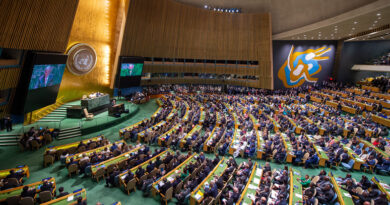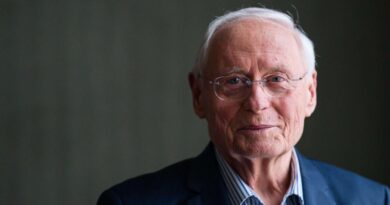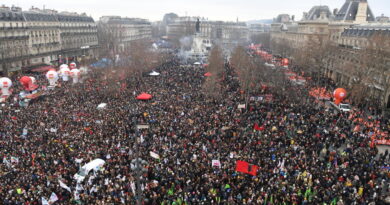Putin and Zelensky: Sinners and Saints Who Fit Our Historical Account
STEPHEN KINZER
Boston (USA)
As war rages in the Ukraine, all is happily peaceful on the home front. Americans have embraced the official narrative. No western movie has ever drawn the line of good versus evil so starkly and clearly. The White House, Congress and the press insist that Ukraine is the innocent victim of unprovoked aggression, that Russian forces will threaten all of Europe if they are not stopped, and that the United States must stand by Ukraine "for as long as possible." necessary” to ensure victory.
Dissent from this consensus is practically impossible. Even in the run-up to our 2003 invasion of Iraq, some lonely voices cried out for restraint. Since we launched into the war in Ukraine, those voices are even harder to find.
Today it is considered heretical, if not treasonous, to suggest that all parties to the Ukraine conflict are somewhat to blame, to argue that the United States should not dump sophisticated weapons into an active war zone, or to question whether we have any vital interest in the outcome. of this conflict. The strict enforcement of a no-fly zone has stifled rational debate on Ukraine.
In the corridors of political power in Washington, Ukraine has become an almost mystical idea. It is less a geographical place than a cosmic plane in which a decisive battle for the future of humanity is taking place. The war is seen as a glorious opportunity for the United States to bloody Russia and show that even though the world's balance of power is shifting, we still rule.
America's outburst of passionate love for Ukrainian President Volodymyr Zelensky was the triumph of an irresistible media campaign. He was presented to her as the new world hero of freedom. Overnight, his image appeared in shop windows and on Internet pages.
In the opposite corner is another caricature, President Vladimir Putin of Russia, portrayed as the epitome of all vile and degenerate qualities. He satisfies our need to focus the hate not on a country, a movement or an idea - that is too diffuse - but on an individual. For years, we have reveled in our moral superiority over colorful nemeses like Castro, Gaddafi, and Saddam Hussein. Putin fits perfectly into this constellation. Having such a cartoonishly evil enemy is almost as reassuring as having the saintly Zelensky as an ally.
Shortly after the war broke out last year, Congress voted to provide $40.000 billion in aid to Ukraine. What was surprising was not just the size of the package, but the fact that all the Democrats voted in favor of it. Only 11 senators and 57 members of the House, all Republicans, opposed it. The press applauded.
No country that is at war, directly or by proxy, encourages debate about whether war is a good idea. The United States is no exception. Abraham Lincoln and Woodrow Wilson jailed critics of the wars they waged. Some opponents of the Vietnam War were prosecuted. The eerie absence of debate about our involvement in Ukraine marks the latest victory for the official narrative.
The Cold War was arguably the most powerfully developed narrative in modern history. For years, Americans were led to believe, and they did, that they were mortally threatened by an enemy that could strike at any moment, destroying the United States and ending all hope of meaningful life on Earth. That enemy was in Moscow.
By then, Americans were used to seeing Russia as the embodiment of "the other," the barbaric force that always threatens civilization. As early as 1873, an American cartoonist depicted Russia as a hairy monster vying with a handsome Uncle Sam for control of the world. That archetype resonates through the generations. Like the majority of the population, Americans are easily mobilized to hate any country we are told to hate. If that country is Russia, we have generations of psychic preparation.
Politicians in Washington can be forgiven for going to war against Ukraine. They assume that the voters, who have more pressing concerns, will not punish them, and that the arms manufacturers will reward them handsomely. Less forgivable is the attitude of the press. Instead of playing the supposed role of her raising uncomfortable questions, she has largely become the main cheerleader for the official narrative on Ukraine.
Most of the information about the front lines comes from “our” side. We read an endless stream of stories about Russian atrocities and other outrages. Many of them are undoubtedly correct, but the imbalance in information leads us to assume that the Ukrainian army does not commit war crimes. An Amnesty International report on the use of human shields by Ukrainians in combat was met with outrage and condemnation. The message is clear: justice is on one side, so the information from the field must reflect it.
Many who write about this conflict seem to believe, like their Cold War predecessors, that the US government is a team and that the press has a role in ensuring our team's victory. This opinion is death for journalism. The press should not be on anyone's team. Our job is to challenge official narratives, not meaninglessly amplify them. That's the difference between journalism and public relations.
For those of us who were war correspondents at a time when conflicts were reported from various perspectives, the one-sidedness of reporting on Ukraine is most striking. I covered Sandinistas and Contras, Serbs and Croats, Turks and Kurds. Those experiences taught me that, in conflicts, neither side has a monopoly on virtue. Today we Americans are told otherwise. We are fed a childish narrative in which all the virtue is on one side and all the evil on the other.
The unwillingness of most war correspondents to cover the Ukrainian war from both sides is reflected in the editorial and opinion pages. No major newspaper seems to raise fundamental questions about this war.
Is Putin justified in not wanting enemy bases on his border? Should we contribute to the death of thousands of people to do politics? Have we contributed to provoking the war? What proportion of the Ukrainian army is pro-Nazi? Why does the United States care where the Donbas border is drawn? Should we take into account Ukraine's reputation as one of the most corrupt countries in the world before sending it huge amounts of aid? Is this conflict really a titanic showdown between democracy and autocracy, or just another European wildfire?
Even as the United States sinks deeper into the Ukraine war, these questions are considered impolite. The suffocating consensus that unites our political parties and the media prevents thoughtful debate. One of the worst outcomes of the Ukrainian war is already clear. It has caused a new closure of the American mind.
stephen kinzer He was chief correspondent for the New York Times in Nicaragua between 1983 and 1989. He worked for that newspaper for more than 20 years, also in charge of its offices in Germany and Turkey. He is the author of “Blood of brothers: life and war in Nicaragua”. Currently, he teaches journalism and works for the Watson Institute for International Public Affairs at Brown University (USA).
This article is published in collaboration with the American magazine Responsible Statecraft.









